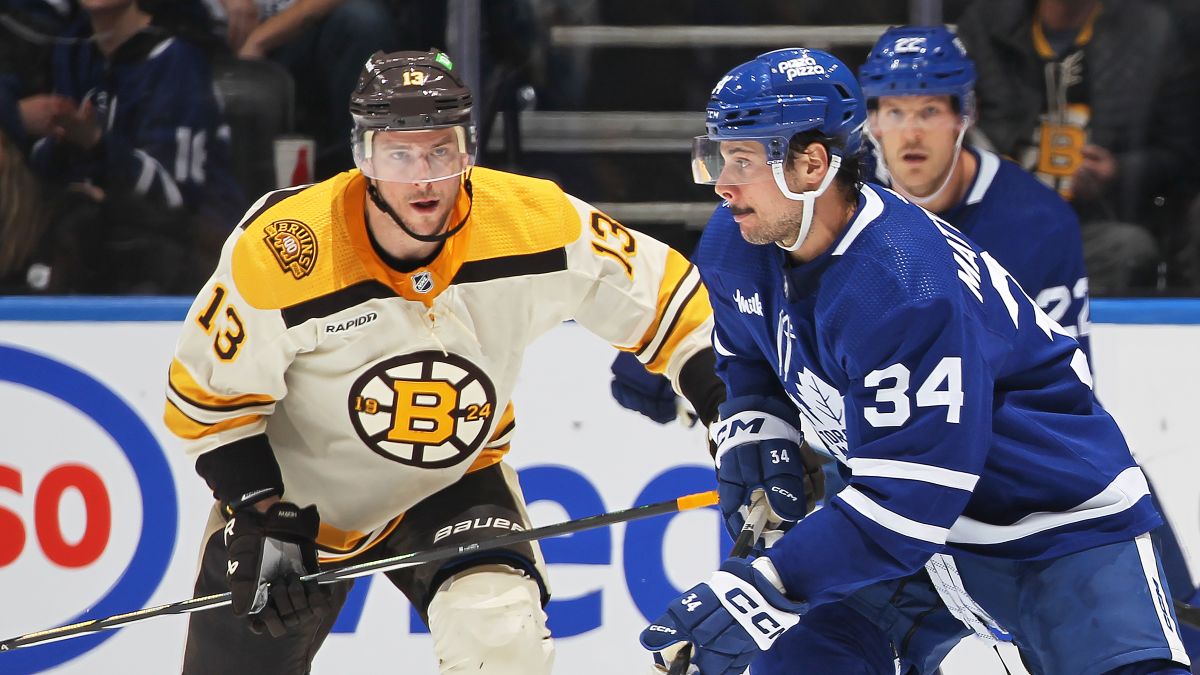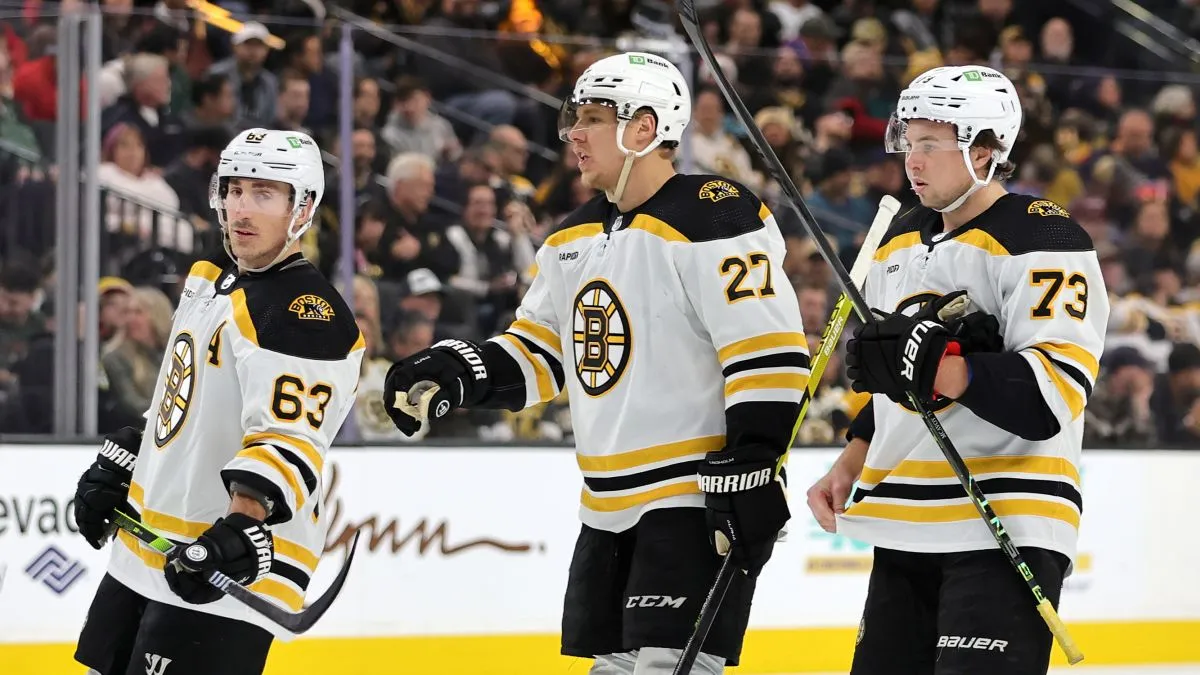
This is the second in a five-part series about the breakdowns that doomed the team this season, and what must change for the Black and Gold to once again get moving in the right direction.
In the days after the Bruins' regular-season demise, it was striking to hear Don Sweeney speak about the development path of David Pastrnak.
The Bruins general manager paid the second-year forward perfunctory compliments about the prodigious skill set that made him a first-round draft choice. Pastrnak -- in spite of getting almost no power-play time, even though he's one of the most gifted offensive players on the roster -- scored five more goals and roughly the same number of points in about the same number of games as he did in his rookie year, despite suffering a fractured foot in the first month and then competing in the World Junior tourney around the holidays. He also gained steam at the end of the season, scoring goals in three of the final four games while the rest of his teammates struggled.
But Pastrnak, one of the youngest players in the NHL at age 19, struggled with puck management and turnovers, and had some rough nights as a teenager making his way in a rough-and-tumble man’s league. He's still on the learning curve, something Sweeney readily acknowledges.
“The impatience about putting players [at the NHL level] before they’re ready, it shows up at times,” said Sweeney, who invoked Pastrnak’s name while answering a question about the potential NHL readiness of promising young B's prospect Danton Heinen. “It absolutely does. We’re talking about David Pastrnak, who leads the league in giveaways per 60 minutes. He’s a tremendous talent and a tremendous young man with tremendous character, and he wants to get better and needs to get stronger.
“At times it’s unfair to [coach Claude Julien] that people will be like ‘Ah, there’s Pastrnak not out there on the ice in this situation.’ But [Julien's] the same guy that put [Pastrnak] out there (in a crucial late-season game against the Red Wings with the Bruins leading 5-1) and he makes a bad mistake and they score . . .
"That’s a bit of give-and-take that everybody has to understand with our younger players. You have to hope that they’re ready for it. [We've] done it properly (in the past) . . . [Brad Marchand] started on the fourth line and worked his way up.
Boston Bruins
"David has been up and down a little bit. That’s the piece where we need to have some depth, and we’re in a transition to get there.”
Sweeney's mention of Marchand illustrates the Bruins' problem. When Marchand broke in, the Bruins were a talented Stanley Cup contender. His first full season was 2010-11, the year Boston won the Cup. The B's could afford to slowly develop him, letting him get his feet wet in low-pressure situations before asking more of him.
That's not the case today. The Bruins no longer have that kind of quality roster depth, and won't anytime soon unless a lot of these prospects come through. That means young players like Pastrnak are forced into bigger roles they might not be ready for.
And that strikes right at the heart of Boston’s development missteps from last season.
Some of it was organizational. It seemed pretty clear by the end of the season that Zach Trotman, Joe Morrow and Brett Connolly aren’t going to develop into core players in Boston. That's just the way it is in a results-oriented business like the NHL. It doesn’t necessarily reflect poorly on the coaching staff’s work, as great coaching can’t magically turn a borderline NHL player into something he’s not.
But while the coaches handled Pastrnak well, they failed at times with Frank Vatrano and Colin Miller. Both showed flashes of NHL ability throughout the season, but spoke of losing their confidence based on their erratic usage patterns. The two of them needed stints in the American Hockey League to get their respective grooves back.
In particular, the electric Vatrano should have been back up with the B's weeks sooner than he was. The Bruins were struggling to score goals and he was rifling them home at a goal-per-game pace in Providence. As soon as he returned to Boston, he posted four points in his five games.
With Julien returning and the Bruins intent on introducing more young talent to the lineup, the transition into the NHL needs to be streamlined.
Given how much of a priority it is for Sweeney, there's no reason to think the process won't be improved.
The hope is that the next crop of B’s prospects will yield results. First-round picks from other organizations, like Morrow and Connolly, mostly fizzled last season, but Boston’s own crop of young players -- Heinen, Brandon Carlo, Austin Czarnik, Noel Acciari -- should augment the contributions of newcomers like Vatrano and Miller. And while most of last year's first-round selections (Jakub Zboril, Jake DeBrusk and Zachary Senyshyn) are probably still more than a year away, the feeling is there'll be a promising return from that batch of draftees. In addition, the Bruins have another two first-round picks this year.
Upper management makes the point that the present situation began developing in the final years of Peter Chiarelli's watch. With singular exceptions like Marchand the team was unable to develop its own talent, which led to overpaying veterans to stay competitive, which led to severe salary-cap issues, which led to the decay of the franchise we've witnessed over the last two seasons.
"I think for a period of time we stopped being in an invest mode (and instead ran) with the guys we had," said owner Jeremy Jacobs. "You pay a price in this game if you’re not constantly investing in the next generation.”
Now, however, it's time to stop the finger-pointing and begin the rebuild in earnest. To their credit, the Bruins say they're doing just that.
“I think we did take a step back this year for that very purpose,” said Jacobs.
Investing in youth is simply the way of the salary-cap world, for the Bruins and everybody else in the NHL. It will have to mean patience and longer leashes for young players under Julien.
“The younger players that we’ve drafted and recently signed and are going to develop are a big part of [the future], as long as they’re good enough players," said Sweeney. "We expect them to be. But when . . . you put them in your lineup is important . . .
"This ownership is very, very supportive of what we need to do. It’s just, ‘Get it done.’ So that’s why the chair is warm [for everybody].”
While Julien clearly did play a role in the emergence of Marchand, David Krejci and Milan Lucic as NHL stars, developing young players has never been one of his coaching strengths. He certainly bears some responsibility for elite young talents like Phil Kessel, Tyler Seguin and Dougie Hamilton not lasting in Boston. The warmth of his chair will depend largely on the development of the new crop of youngsters. That will be doubly so if Providence Bruins head coach Bruce Cassidy ends up getting a job as an assistant in Boston next season, and gets a chance to work with the young players he’s helped develop at the AHL level.
The bottom line is this for the Bruins: They need the best draft-and-development season they’ve had in quite a while if things are going to significantly change for the better on Causeway Street.


